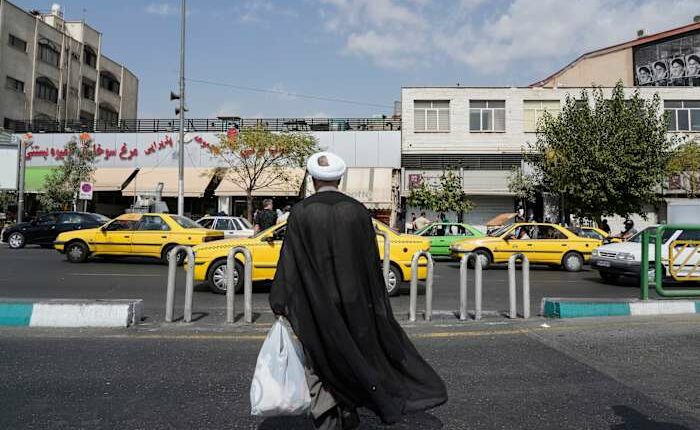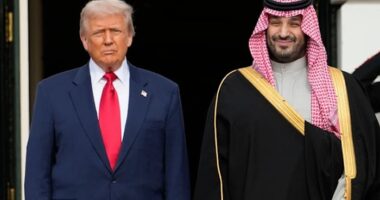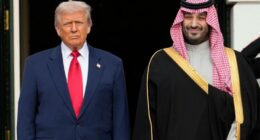Share this @internewscast.com

DUBAI – On Sunday, Iran contemplated its options in response to the United Nations re-imposing sanctions on its nuclear program. A legislator suggested that the parliament might consider withdrawing from the Nuclear Nonproliferation Treaty as one possible action.
The renewed sanctions are set to freeze Iran’s overseas assets, halt arms transactions with Tehran, and impose penalties on any progress in Iran’s ballistic missile development, among other restrictions. This move, part of a mechanism called “snapback” in the 2015 nuclear agreement with major world powers, has come at a time when Iran’s economy is already under severe strain.
The Iranian currency, the rial, has hit a historic low, exacerbating the cost of food and complicating daily living. Essentials such as meat, rice, and other staple foods have become increasingly difficult to afford for most Iranians.
Additionally, there is growing concern in Iran over the possibility of renewed conflict with Israel or the United States. Missile sites that were targeted during the 12-day conflict in June are believed to be undergoing reconstruction.
In a conversation with the Young Journalists Club, linked to Iranian state television, legislator Ismail Kowsari mentioned that the parliament would deliberate on withdrawing from the nuclear treaty.
“Parliament will discuss this issue … and decide on it,” he said.
Parliament speaker Mohammad Bagher Qalibaf issued his own warning to those who would honor the U.N. sanctions as parliament began meeting Sunday.
According to a report by the state-operated IRNA news agency, Qalibaf stated, “We affirm that any nation acting against Iran based on these unlawful resolutions will face significant reciprocal measures from Iran. The three European countries responsible for initiating this illegal action will also experience our response,” although he did not provide further details.
Iran considers withdrawing from treaty
France, Germany and the United Kingdom triggered snapback over Iran 30 days ago for its further restricting monitoring of its nuclear program and the deadlock over its negotiations with the U.S.
Iran further withdrew from the International Atomic Energy Agency monitoring after Israel’s war with the country in June, which also saw the U.S. strike nuclear sites in the Islamic Republic.
Meanwhile, the country still maintains a stockpile of uranium enriched up to 60% purity — a short, technical step away from weapons-grade levels of 90% — that is largely enough to make several atomic bombs, should Tehran choose to rush toward weaponization.
Iran has long insisted its nuclear program is peaceful, though the West and IAEA say Tehran had an organized weapons program up until 2003.
The three European nations on Sunday said they “continuously made every effort to avoid triggering snapback.” But Iran “has not authorized IAEA inspectors to regain access to Iran’s nuclear sites, nor has it produced and transmitted to the IAEA a report accounting for its stockpile of high-enriched uranium.”
The nations also noted Iran enriches uranium at a level that no other peaceful program does.
Asked by the Young Journalists Club if Iran’s withdrawal from the treaty meant moving toward building the bomb, Kowsari said: “No, it does not mean that. This issue will be reviewed separately later, and we can have it on the agenda if necessary.”
Tehran maintains ‘snapback’ shouldn’t have happened
Tehran has argued the three European nations shouldn’t be allowed to implement snapback, pointing in part to America’s unilateral withdrawal from the accord in 2018, during the first term of President Donald Trump’s administration.
U.S. Secretary of State Marco Rubio praised the three European nations for “an act of decisive global leadership” for imposing the sanctions on Iran and said “diplomacy is still an option.”
“For that to happen, Iran must accept direct talks,” Rubio said.
However, it remains unclear how Tehran will respond Sunday.
“The Trump administration appears to think it has a stronger hand post-strikes, and it can wait for Iran to come back to the table,” said Kelsey Davenport, a nuclear expert at the Washington-based Arms Control Association. “Given the knowledge Iran has, given the materials that remain in Iran, that’s a very dangerous assumption.”
Risks also remain for Iran as well, she added.
“In the short term, kicking out the IAEA increases the risk of miscalculation. The U.S. or Israel could use the lack of inspections as a pretext for further strikes,” Davenport said.
___
Vahdat reported from Tehran, Iran. Associated Press writer Nasser Karimi in Tehran contributed to this report.
___
The Associated Press receives support for nuclear security coverage from the Carnegie Corporation of New York and Outrider Foundation. The AP is solely responsible for all content.
___
Additional AP coverage of the nuclear landscape: https://apnews.com/projects/the-new-nuclear-landscape/
Copyright 2025 The Associated Press. All rights reserved. This material may not be published, broadcast, rewritten or redistributed without permission.











